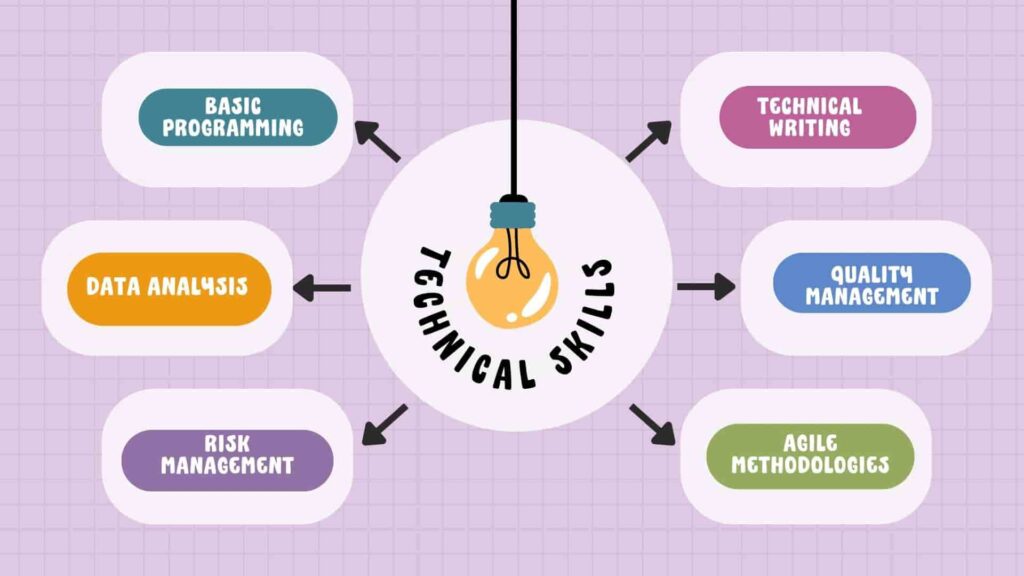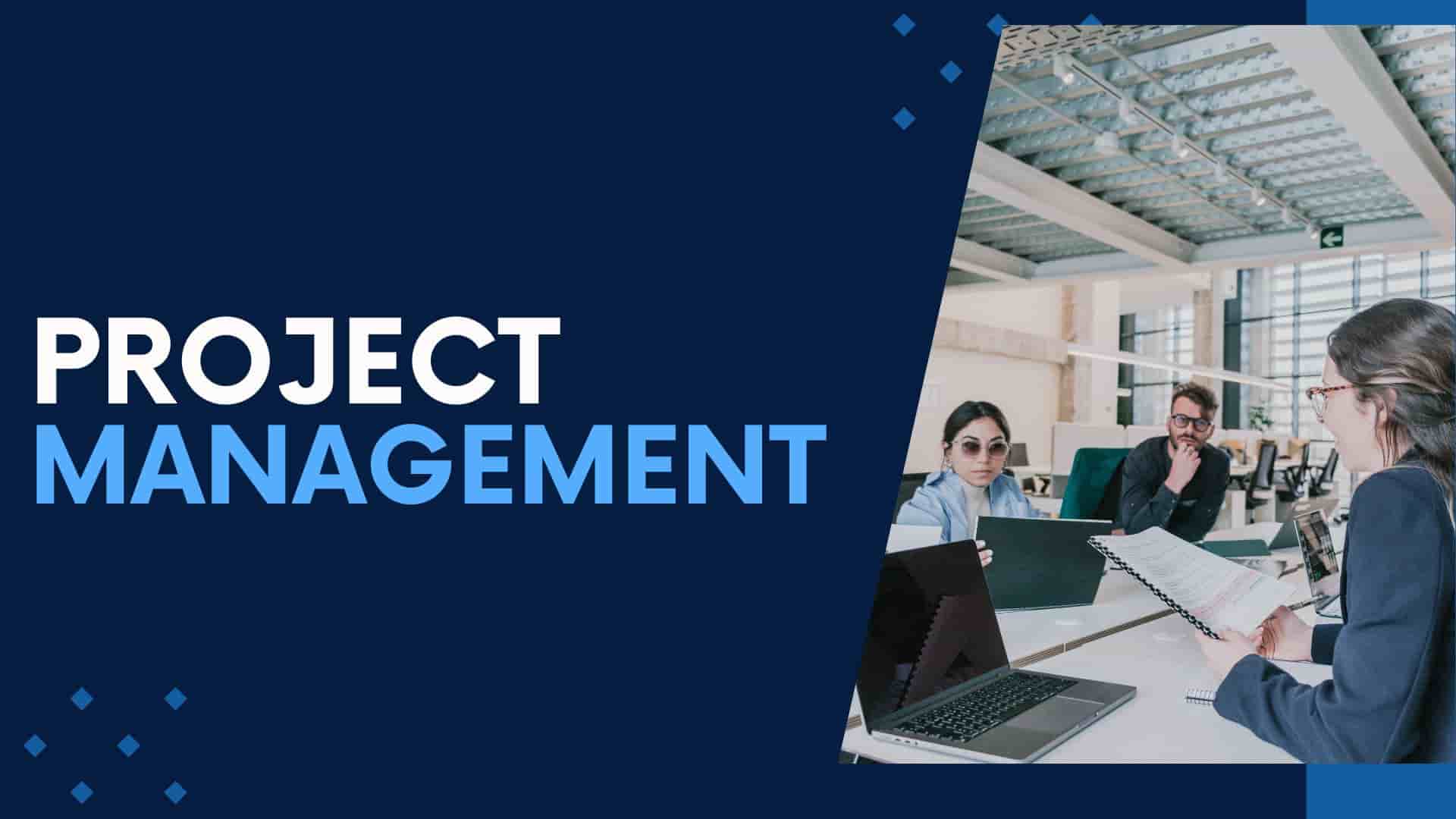Are you a project manager wondering about the technical skills required for effective project management?
So this article is for you, today we discuss the technical skills that can enhance your project management abilities. From basic programming knowledge and understanding of IT concepts to proficiency in project management software, data analysis, communication and collaboration tools, risk management, quality management, agile methodologies, and technical writing, we cover it all. Discover how these technical skills can help you excel in managing projects and achieving success.

Introduction
As a project manager having technical skills can greatly enhance your ability to effectively manage projects, communicate with team members, and understand project requirements.
Here are some technical skills that are beneficial for project managers
Technical skills for project manager
- Basic Programming and IT Understanding
- Project Management Software
- Data Analysis
- Communication and Collaboration Tools
- Risk Management
- Quality Management
- Agile Methodologies
- Technical Writing
Basic Programming and IT Understanding
Understanding the basics of programming and IT is essential for project managers working on technical projects.
As a project manager, you don’t need to be an expert in programming but having a basic knowledge of programming language and IT concepts is a good skill for project management.
This skill is also good for communicating more effectively with your technical team and making informed decisions regarding the project’s technical aspects.
Having a foundational knowledge of programming and IT allows you to engage more effectively with your team, grasp technical aspects, and successfully manage technical projects.
Project Management Software
Familiarity with project management tools and software such as Microsoft Project, Jira, Asana, or Trello can help you plan, track, and monitor project progress efficiently.
- What is project management software?
Project management software is specialized tools or platforms designed to help project managers and teams plan, organize, track, and collaborate on projects more efficiently.
These software solutions aim to streamline project management processes and provide a centralized platform for all project-related information and tasks.
One of the key advantages of project management software is its ability to visualize project timelines and task dependencies.
Project management software also offers features for resource management, where you can allocate resources such as people, equipment, or materials to specific tasks.
This helps ensure that resources are properly utilized and that there are no overloading or conflicts in assignments.
Data Analysis
Being able to analyze project data and metrics is crucial for making informed decisions. Proficiency in tools like Microsoft Excel or data visualization platforms like Tableau can assist you in analyzing project performance and identifying areas for improvement.
- What is data analysis?
Data analysis is the process of examining and evaluating data to find significant trends, patterns, and insights.
It involves using various techniques, tools, and statistical methods to understand the data and draw conclusions.
data analysis is a like detective’s job.
Big companies have a large amount of data, it can be like having puzzle pieces scattered all around.
Data analysis helps you put those puzzle pieces together and discover the hidden story within.
Data analysis starts with collecting and organizing data.
Communication and Collaboration Tools
Familiarity with collaboration tools like Slack, Microsoft Teams, or Zoom can enhance communication and collaboration among team members, especially when working remotely or with distributed teams.
- Explanation of communication tools
Communication and collaboration tools are software applications or platforms designed to facilitate efficient and effective communication and collaboration among team members, regardless of their geographical locations.
Communication tools provide many features and functionalities that make connecting, exchanging information, and working together on projects easier.
They provide features like instant messaging, audio and video calls, and even virtual meeting rooms.
Instead of waiting for emails or scheduling long meetings, you can have quick conversations, ask questions, and share updates on the spot. - What is a collaboration tool?
Collaboration tools focus on helping you work together on documents, projects, or tasks.
They provide shared workspaces where team members can collaborate simultaneously, make edits, and provide feedback.
These tools often include features like document sharing, version control, and commenting, allowing for seamless collaboration.
Everyone can work on duplicate files, see changes in real time, and avoid the confusion of multiple document versions.
Another advantage of communication and collaboration tools is their ability to store and organize project-related information.
They act as a central hub where you can keep documents, files, and important project updates.
Risk Management
Understanding risk management frameworks and techniques allows you to identify and mitigate potential risks that may impact project success. Tools like risk registers, risk assessment matrices, and risk mitigation strategies are valuable for effective risk management.
Quality Management
Knowledge of quality management principles and methodologies such as Six Sigma or Total Quality Management (TQM) can help you ensure that project deliverables meet the required quality standards.
Agile Methodologies
Familiarity with Agile frameworks like Scrum or Kanban.
Agile approaches promote flexibility, adaptability, and collaboration, allowing you to manage projects iteratively and incrementally, delivering value to stakeholders more efficiently.
Technical Writing
Strong written communication skills are essential for documenting project requirements, creating project plans, and writing clear and concise project reports. The ability to convey technical information effectively is crucial for project success.
Remember that along with technical skills project management also requires a wide range of non-technical skills such as leadership, communication, problem-solving, and organizational skills. It’s important to balance technical and soft skills to excel as a project manager.
Conclusion
To excel as a project manager, it’s crucial to have a solid grasp of various technical skills. By possessing a basic understanding of programming and IT, you can effectively communicate with your technical team and make informed decisions regarding project requirements. Familiarity with project management software streamlines planning, tracking, and monitoring project progress. Data analysis skills enable you to analyze project data and identify areas for improvement, while communication and collaboration tools facilitate effective teamwork. Understanding risk management, quality management, and agile methodologies adds a strategic edge to your project management approach. Additionally, strong technical writing skills enable you to document project requirements and communicate effectively.
FAQS
What is project management software?
Project management software refers to specialized tools or platforms designed to streamline project management processes. They provide features for planning, organizing, tracking, and collaborating on projects, offering a centralized platform for project-related information and tasks. These tools visualize project timelines, assist in resource management, and ensure efficient allocation of resources.
What is data analysis?
Data analysis involves examining and evaluating data to identify trends, patterns, and insights. It encompasses techniques, tools, and statistical methods to understand and draw conclusions from data. Data analysis is akin to solving a puzzle, piecing together scattered information to uncover the hidden story within. It begins with collecting and organizing data.
What are communication and collaboration tools?
Communication and collaboration tools are software applications or platforms that facilitate efficient and effective communication and collaboration among team members, regardless of their geographical locations. These tools offer features like instant messaging, audio and video calls, and virtual meeting rooms, promoting quick conversations, information exchange, and seamless collaboration. They also serve as central hubs for storing and organizing project-related information.
Why is technical writing important for project managers?
Technical writing is essential for project managers as it enables them to document project requirements, create project plans, and write clear and concise project reports. Strong written communication skills are crucial for conveying technical information effectively, ensuring that all stakeholders have a clear understanding of project deliverables and objectives.
What are agile methodologies?
Agile methodologies, such as Scrum or Kanban, are frameworks that promote flexibility, adaptability, and collaboration in project management.
These approaches emphasize iterative and incremental development, allowing for continuous delivery of value to stakeholders.
Are soft skills important for project managers?
Absolutely!
Alongside technical skills, project managers need a range of non-technical or soft skills.
Leadership skills help in guiding and motivating teams, while effective communication skills facilitate clear and efficient information exchange.
Problem-solving abilities are vital for overcoming challenges, and organizational skills ensure projects are well-structured and tasks are properly managed.
Balancing technical and soft skills is crucial for excelling as a project manager.










